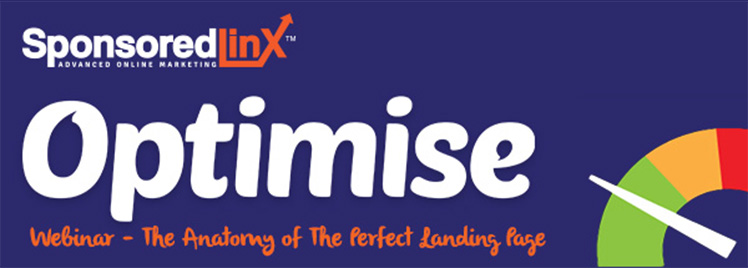-
Traffic
Get More Traffic
SponsoredLinX offers a number of different services to help drive more qualified traffic to your website. Google Ads Management Search Engine Optimisation Microsoft Ads Facebook Advertising Google Ads Mobile“SponsoredLinX are a rarity in today’s market place, they promise a lot but deliver more. Our business has grown by over 400% in one month; we are amazed at the difference they have made.”
-
Conversion
Convert More Leads
Our second step is making sure that your website is able to convert the traffic you receive into leads for your business. Optimising your website to convert more leads is important to a profitable campaign. Web Development Convertopages Do It For Me eCommerce“I just want to say thank you! The changes that you have applied in our AdWords campaign have definitely seen an improvement on click quality and sales for HippityHop.”
-
Retention
Retain Your Customers
As you build up a customer base you need to make sure to keep engaged and retain your relationship. LinX App“SponsoredLinX fully redesigned our main company website with a fresh, clean and professional look. The ‘Google friendly’ web design were part of the fantastic ongoing service we received.”

Testing is the Pathway to Landing Page Optimisation
Bounce Rate – what is it and does it really matter? You have probably heard that your website’s bounce rate is a clear indication of how relevant and successful your website, and landing pages, are. This is not entirely true. If you have been told this, or read this, then we’ve got news for you. Don’t get me wrong, analysing a bounce rate is still important, but, its relevance is totally reliant on what landing page and web page within your website you are analysing.
Firstly, according to Google Analytics a, “Bounce Rate is the percentage of single-page sessions (i.e. sessions in which the person left your site from the entrance page without interacting with the page)”. Seems fairly straight-forward and easy to understand; but take another look. If we relate this back to landing pages, which are stand-alone webpages designed to convert customers who have interacted with your Pay-per-Click online marketing (which is where the majority of landing page traffic comes from) then doesn’t it make sense that landing pages would have a relatively high bounce rate?
As discussed in a blog on Optimise eCentre, one of the key elements of a great landing page is not giving users a reason to leave; this means taking it easy on the hyperlinks within the copy on the page. They can be distracting and can entice customers to click away from the landing page, which is where you want them to carry out whatever desired action you deem a conversion. But, because landing pages do not encourage a customer to continue browsing through your website (as they are stand-alone landing pages coupled with your PPC campaign) then you are narrowing the options of the customer as to what they can do next. They can either convert, or, they can click away from your landing page. Yes, this will help to increase conversions because they have fewer options and more of a reason to follow through on your CTA, but, this will also increase your bounce rate, because it is the only other option they have. Beginning to see why a bounce rate isn’t always as reliable as you previously thought?
You want your conversion rate percentage to be as high as possible, and this is what you should focus your energy on. A low conversion rate signifies that for some reason, when people are viewing this particular landing page, they are clicking out of it quite quickly without completing a desired action. Understandably conversion rates will vary for different types of landing pages depending on the search query and the purpose of the landing page. For example, if you have a landing page which is triggered for a search query such as ‘buy {item name here} free shipping Australia-wide’, and the page has been designed to sell said item, but you have a low conversion rate for this landing page, then you have a problem. For whatever reason, your customer’s are not finding the information they want on your landing page. This could be because there is a discord between your Google AdWords ad copy, which is the source directing traffic to the landing page, and the copy on your landing page, for example. Truthfully there could be many different reasons, but without analysing the analytics of the landing page, there is no way of knowing.
As part of the optimisation process for your landing pages, then you must also perform keyword analysis on a regular basis. You can be informed of which keywords are relevant for your landing pages based on data from your Google AdWords campaigns. Coupled with this, you also need to test the designs, layouts and functions of your landing pages to see which convert best. Simply try using one landing page, then replace it with another and see which one works best. Testing is such an integral part of optimising your landing pages, and without testing you can never truly know if there could be a better solution to what you are currently implementing. The same kind of testing can be done with the copy used on landing pages as well, but as a guide, presenting a relatable scenario which poses a problem, followed by a solution which you provide and a CTA follows a logical sequence. You can determine what a ‘conversion’ is to you, whether that’s someone completing a form or purchasing a product or service, and you can also track your progress by setting up conversion goals.
Drilling down into specific landing page analytics doesn’t have to sound like a data nightmare. Luckily, here at SponsoredLinX we encourage the use of a platform called Convertopages 2.0 and it translates this statistical nightmare into layman’s terms; easy to understand, effective and efficient. You can easily see how many visits you’re receiving, which device your visitors are coming from and how many conversions you have. All this information allows you to constantly revisit your landing page strategy to test new amendments for further optimisation and conversions.
Avoid the analytical headache and register for our November Optimise Webinar, ‘The Anatomy of the Perfect Landing Page’ for free here, which will go live at 10:30 am AEST on Wednesday 18th November. We can’t wait for you to join us! If you are eager to get started with Convertopages 2.0 straight away, simply give us a call on 1300 859 600 or visit our website.


